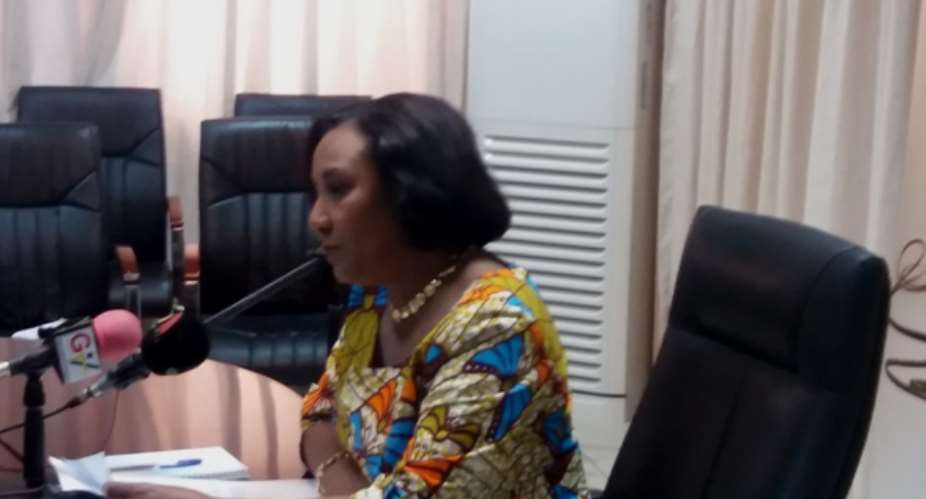A Deputy Minister of Finance, Mona Quartey has told Citi Business News that Ghana may have to renegotiate its deal with the IMF should Parliament approve a 5% financing of government's budget deficit.
According to her, government is willing to accept the decision of the legislature on financing government's budget deficit from the central bank.
“It will mean renegotiations and discussions with the IMF because the preferred option is the zero percent from the central bank. But remember also that the zero percent is even so different from the West African Monetary zone convergence criterion which is 10%,” she explained.
Mrs Mona Quartey's comments come at a time that the Institute for Fiscal Studies (IFS), is proposing 5% financing of government's budget deficit instead of zero financing proposed by the International Monetary Fund (IMF).
Parliament is also currently considering a proposal in the Bank of Ghana Amendment Act to cap the BoG's funding of the country's budget deficit at 5 percent of total revenue for the previous year from the current 10 percent.
Madam Quartey who spoke to Citi Business News on the sidelines of the Finance Minister's presentation of this year's mid-year budget review in Parliament on Monday, was confident of a favourable outcome of the discussions.
“The debate has not taken place so we are expecting it to take place and hopefully, as a nation we will come out with what should be good for Ghana…If it has to be zero, it will be so. But if Parliament decides on another figure, we will equally work with that,” she further stated.
One of the conditions under the IMF's Extended Credit Facility (ECF) Program with Ghana is for the central bank to embark on a zero-financing of government's budget deficit.
Currently, the BoG Act requires that the central bank's monetary financing must not exceed 10 percent of the previous year's total revenues.
But, consistently, the BoG has not been able to keep to this limit.
Some industry watchers have argued that the country's economic assistance program with the IMF could be curtailed if Parliament upholds the 5 percent financing decision.
But Member of the Finance Committee of Parliament, Benjamin Kpodo has since dismissed such concerns.
He rather believes that any issue with the IMF Board to possibly delay the release of funds will have to do with the country’s inability to pass the Public Finance Management Act.
The Deputy Finance Minister was however of the view that a complete adherence to the IMF's suggestions could largely be practicable if it is limited to the period of the program with Ghana.
“If there is the need for the current practice to be curtailed, one would have even thought that perhaps the negotiations should be about curtailing for during the period of the IMF program. But the IMF is asking us to put it into law and I think that is where other members of the House are having a problem. So we have to justify to them why it should be zero percent in law,” Mona Quartey stressed.
Meanwhile Finance Minister, Seth Terkper on Monday said that the government's cash deficit of 2.5 percent for the first five months of 2016, which was up from a target of 2.2 percent, was for the first time not funded by the Bank of Ghana.
–
By: Norvan Acquah-Hayford/citibusinessnews.com/Ghana





 Saglemi Housing Project will not be left to rot – Kojo Oppong Nkrumah
Saglemi Housing Project will not be left to rot – Kojo Oppong Nkrumah
 Transport fares hike: GPRTU issue two-day ultimatum
Transport fares hike: GPRTU issue two-day ultimatum
 ARC endorses Alan as presidential candidate – Buaben Asamoa
ARC endorses Alan as presidential candidate – Buaben Asamoa
 Akufo-Addo appoints Kwasi Agyei as new Controller and Accountant-General
Akufo-Addo appoints Kwasi Agyei as new Controller and Accountant-General
 PNC dismiss reports of mass resignations
PNC dismiss reports of mass resignations
 PAC advocates for revenue collectors to be engaged on commission basis, not full...
PAC advocates for revenue collectors to be engaged on commission basis, not full...
 Genser Energy commissions 110km of natural gas pipeline at Anwomaso
Genser Energy commissions 110km of natural gas pipeline at Anwomaso
 Naa Torshie calls for tolerance, peace ahead of 2024 election
Naa Torshie calls for tolerance, peace ahead of 2024 election
 Asantehene commends Matthew Opoku Prempeh for conceiving GENSER Kumasi Pipeline ...
Asantehene commends Matthew Opoku Prempeh for conceiving GENSER Kumasi Pipeline ...
 Let’s do away with ‘slash and burn politics’ in Ghana — Dr Adutwum
Let’s do away with ‘slash and burn politics’ in Ghana — Dr Adutwum
